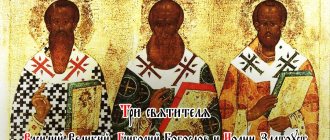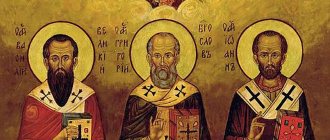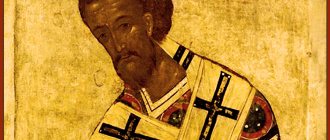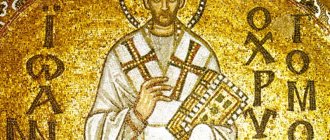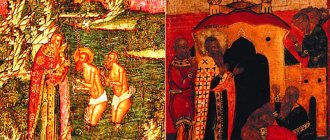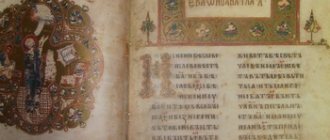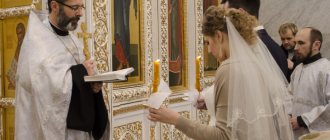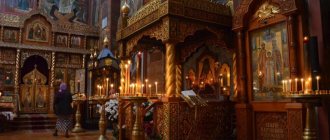The memory of St. John Chrysostom , Patriarch of Constantinople, is established annually on November 26 (November 13 according to the strict style) in honor of the anniversary of his accession to the archbishop's see. The holy fathers call Saint John Chrysostom “the mouth of Christ, the universal luminary, the universal teacher.” John Chrysostom was from Antioch. He studied with the best philosophers and rhetoricians. Since 398, John Chrysostom has been Archbishop of the Church of Constantinople. He was the greatest preacher and left us a great theological legacy. The works of John Chrysostom are recognized by researchers as the most important sources on the history of Antioch in the 4th century.
Priestly ministry of monk John and theological works
Saint John Chrysostom (Chrysostom), Archbishop of Constantinople, is one of the three Ecumenical Hierarchs. Born around 347 in Antioch , in the family of a military leader. His father, Secundus , died shortly after the birth of his son. John's mother, Anfisa , remained a widow at the age of twenty. She decided not to marry again, but to devote herself to raising her son in Christian piety. Young John studied with the best philosophers and rhetoricians of the time. One of his teachers was a representative of sophistry, the head of the rhetorical school in Antioch - Libanius (314-193). From an early age, John turned to the study of the Holy Scriptures and prayer. In 367, he received holy baptism from his mentor, Bishop of Antioch Meletius (d. 381). Three years later, John was ordained as a reader. In 372, Bishop Meletius was sent into exile by Emperor Valens (328-378). John, together with Theodore (c. 350-428; later Bishop of Mopsuestia), studied at the theological school of Antioch with presbyters Flavian and Diodorus of Tarsus.
When John's mother died, he took monastic vows. Soon John was considered worthy for the episcopal rank. However, he chose not to become a bishop. During this period John wrote his great work, Six Words on the Priesthood . He spent four years in the desert, where he created such works as “ Against those who take up arms against those seeking monasticism ” and “ Comparison of the Monk with the Tsar ” (“Comparison of the power, wealth and advantages of the king with the true and Christian wisdom of monastic life”), imbued with a high idea of dignity of monastic rank. For two and a half years he labored in silence while in a cave.
When John returned to Antioch, Bishop Meletius made him a deacon (381). John created such theological works as “ On Providence ” (“To Stagirius the Ascetic”), “ The Book of Virginity ”, “ To the Young Widow ” (two words), “ The Book of Saint Babylon and Against Julian and the Pagans ”. In 386, John was ordained a presbyter by Bishop Flavian of Antioch (320-404). Prester John became a brilliant preacher of the Word of God. For his gift of the God-inspired word, he received the name “ Chrysostom ” from the flock. For twelve years, twice a week, and sometimes daily, John preached in church to a large crowd of people. At this time, he wrote commentaries on a number of books of the Holy Scriptures and many conversations on individual biblical texts, as well as teachings on holidays, in praise of the saints and apologetic words (against the Anomeans, Judaizers and pagans). In addition, Prester John had concern for the poor: the Church of Antioch provided food daily for up to 3,000 virgins and widows, not counting prisoners, wanderers and the sick. At the beginning of Great Lent in 388, Prester John began an interpretation of the book of Genesis, which he completed at the end of October. During Lent, he delivered 32 discourses. During Holy Week he spoke about the traitor and about the Cross, during Easter Week and until Pentecost he preached daily sermons.
From Easter the following year, John began expounding the Gospel of John, and at the end of 389 he moved on to the Gospel of Matthew. In 391, the Christians of Antioch listened to his interpretation of the Epistles of the Holy Apostle Paul to the Romans and Corinthians. From 393 he turned to Galatians, Ephesians, Timothy, Titus and the Psalms. In a conversation on the Epistle to the Ephesians, John denounced the Antiochian schism: “I say and testify that to tear the Church apart means no less than to fall into heresy. The Church is the house of the Heavenly Father, One Body and One Spirit.”
Return to Antioch
Due to constant physical illness, the monk was forced to return to his hometown. There he continued his communication with Saint Meletius, who convinced his ward to accept the rank of deacon in 381. Five years later, Chrysostom was ordained a priest. Another 5 years later he became a presbyter.
When Meletius was sent into exile, John began to learn from other mentors of the ascetic life. Presbyters Flavian and Diodorus of Tarsus shared their experience with him.
John was in constant contact with his charges, giving them wise advice and preaching tirelessly. He considered the years of the priesthood the happiest of his life. Chrysostom's sermons made an incredible impression on his listeners, and it was then that he received his nickname. The priest's real name remains unknown.
In 397, at the request of the emperor, the man became archbishop. He was given a difficult but very important task - John enlightened people, helped them get away from the old way of life and paganism. Unlike many priests, Chrysostom himself always adhered to the principles he preached. He set an excellent example by regularly donating his property to charity, especially to build hospitals for poor people.
Saint John Chrysostom - Archbishop of Constantinople
In 397, Archbishop Nektarios of Constantinople reposed. John was summoned from Antioch to be appointed to the see of Constantinople as archbishop. He began his archpastoral labors with the improvement of the priesthood. John donated the funds intended for the archbishop to maintain several hospitals and hotels for pilgrims. Archbishop John himself ate very sparingly and did not attend church feasts. He was involved in establishing Christianity not only in Constantinople, but also in Thrace, Asia Minor, and the Pontic region. John sent the most zealous Christian missionaries to preach in Phenicia and Persia. John wrote letters to Syria to restore the Marcionite Church, and achieved this. Preserving the unity of the Church, the saint did not allow the powerful Gothic military leader, who was dictating his terms to the emperor, to open an Arian temple in Constantinople. The saint put a lot of work into organizing a splendid Divine service: he composed the rite of the Liturgy, introduced antiphonal singing at the all-night vigil, and wrote several prayers for the rite of the blessing of oil.
Persecution of Archbishop John Chrysostom
Archbishop John denounced the licentiousness of the capital's morals, especially the imperial court. Empress Aelia Eudoxia (d. 404), wife of Emperor Flavius Arcadius (377-408), ordered the confiscation of the last property from the widow and children of the disgraced nobleman. Archbishop John interceded for the widow. But the empress did not yield and was angry with the archpastor. Her anger flared up even more when her ill-wishers told her that Archbishop John had her in mind in his teaching about vain women. The court, consisting of the hierarchs whom John had previously denounced, decided to deprive him of his rank and execute him for insulting the empress. But Emperor Arkady replaced the execution with exile. The people stood up for their archpastor. To avoid unrest, John himself gave himself into the hands of the authorities. That night a terrible earthquake occurred in Constantinople. Frightened Eudoxia asked her husband to return John from exile and sent him a letter begging for his return. But after a while, another denunciation awakens Eudoxia’s anger.
Saint John Chrysostom with his life. Icon of the mid-16th century. From the Fedorovsky Monastery of Pereslavl-Zalessky. PZIKHMZ
In March 404, an unrighteous Council was held, which decided to expel St. John. After the execution of the decree, the Church of Hagia Sophia and the Senate building burned down. Devastating barbarian raids soon followed. The slanderers fled to Alexandria. But after two months, a new denunciation awakens Eudoxia’s anger. And again in the capital’s church, the saint in a short speech blesses the Lord “for all His ways.” Eudoxia died in October 404. Even the pagans saw in these events heavenly punishment for the unrighteous condemnation of the saint of God.
Library of the Russian Faith Teachings in memory of St. John Chrysostom. Great Menaion of Cheti →
Read online in original
Christian service
Returning again to society, John agreed to accept church rank, and in 381 Meletius ordained the righteous man to the rank of deacon, and five years later to the rank of presbyter. One of John's duties was to preach sermons. The education he received in his youth, the gift of speech, as well as sincere faith helped John become a brilliant preacher. People from other cities came to listen to him, John’s interpretations were passed on from mouth to mouth, and hearing words of support and encouragement from the preacher was tantamount to God’s blessing.
Archbishop John Chrysostom
For such a gift of words, the preacher was nicknamed Chrysostom. For 12 years, John Chrysostom preached in the church, analyzed the meaning of the Word of God with parishioners, wrote down his own interpretations of Scripture and prayers, as well as teachings and instructions for believers. The works “To the Young Widow”, “On Providence” and many others belong to the pen of John Chrysostom.
In 397, Archbishop Nektarios of Constantinople died. John was called to replace him as patriarch. John began his “career” in such a high position with the education of priests. In addition, John spent the material resources intended for the clergy on maintaining hospitals and helping the poor and wandering pilgrims. Rumors about the kindness and justice of John were passed from mouth to mouth, so his name soon became known to believers.
Relics of John Chrysostom
There were also conflicts. One day, Empress Eudoxia (wife of Emperor Arcadius) ordered the confiscation of all property from the widow and children of an executed nobleman. John Chrysostom stood up for an innocent woman with small children, for which he earned the anger and hatred of the willful empress. Envious people and sycophants were quick to take advantage of the situation: soon Eudoxia was informed that John allegedly had her in mind in his sermon about vain women.
John Chrysostom was immediately brought to trial. The sentence turned out to be harsh: the righteous man was to be deprived of his church rank, and then executed for insulting the great empress. However, Emperor Arkady turned out to be a more prudent and merciful person. The ruler replaced the execution with exile. God's punishment was not long in coming: on the same night that John Chrysostom left the city, Eudoxia's child died in his crib, and a terrible earthquake struck the city.
John Chrysostom and Empress Eudoxia
Fearing the wrath of God, the woman begged her husband to return John to Constantinople, sending a messenger for the righteous man. However, fear did not briefly cool Eudoxia’s willfulness - just two months later, the empress again convened a trial against John Chrysostom, believing another malicious denunciation. And again the righteous man was condemned to exile.
Frustrated by the injustice of the sentence, John sent a request for help to Pope Innocent I. He took pity on John and even sent a high delegation to Constantinople. Unfortunately, the papal ambassadors never reached their goal: first the priests were arrested and then sent back altogether.
John Chrysostom celebrates the Divine Liturgy
This is how John Chrysostom ended up in Armenia. Despite the removal from friends, like-minded people and parishioners, the righteous man did not renounce the service of the Lord. John constantly wrote letters, which he sent to different parts of the world, including Constantinople. These messages, some of which have survived to this day, contain instructions for believers, as well as words of encouragement and comfort to those who need it.
Repose of Archbishop John Chrysostom
John, while in Armenia, strengthened his spiritual children in the faith. His numerous letters to the bishops of Asia, Africa, and Europe have been preserved. In 405 John fell ill. But his ill-wishers continued to commit outrages. An order came from Constantinople to transfer John to Pithiunt (Abkhazia). John made the transition, which lasted three months in rain and heat, under escort, being weakened by illness. In Comana his strength left him. At the crypt of St. Basilisk, consoled by the appearance of the martyr (“Don’t be discouraged, brother John! Tomorrow we will be together”), having received the Holy Mysteries of Christ, John with the words “Glory to God for everything!” passed away to the Lord on September 14, 407.
John was buried in Comana Pontica.
In 438, his relics were transferred to Constantinople. According to legend, during this event the people shouted with one voice: “Accept your throne, father!”, and the lips of the saint, lying incorrupt in the tomb, opened, and he exclaimed “Peace to all!” During the Fourth Crusade (1204), the relics of St. John were taken from Constantinople to Rome, and on November 26, 2004, by decision of Pope John Paul II, they were returned to the Church of Constantinople along with the relics of Gregory the Theologian and are stored in the Cathedral of St. George in Phanar.
Transfer of the relics of St. John Chrysostom to Constantinople to the Church of the Holy Apostles. Miniature Minology of Vasily II. Constantinople. 985 Vatican Library. Rome
John Chrysostom is the author of the liturgy of the Byzantine rite, which, according to the Charter, is celebrated on most days of the liturgical year.
Persecution by the authorities
For a Christian, the money and positions of the residents of the capital did not matter. He boldly exposed the sins of others, and therefore acquired many influential enemies. Among them was Empress Eudoxia, accused of injustice and craving for luxury. It was not without her support that the persecution of Chrysostom began. On the initiative of the ruler, a Council was convened in 403, at which the archbishop was accused of embezzlement and defrocked. He was sentenced to exile, despite violent public protests. The decision was later reversed, but not for long.
In 404, John was forced to move to Armenia. There he continued to write letters to bishops and friends, trying to support suffering people even from a distance. Due to constant stress, his health continued to deteriorate. In the winter of 406, Chrysostom found himself bedridden, and a little later another order came from the capital. The speaker had to go to a remote town in Abkhazia. He spent three months moving, enduring bullying and humiliation from the guards. On September 14, 407, Chrysostom died in Comana. The Christian Church posthumously added him to the list of saints.
Veneration of St. John Chrysostom. Troparion, Kontakion and Canon
John Chrysostom is revered among the three “ ecumenical teachers ” (together with Basil the Great and Gregory the Theologian), the celebration in their honor takes place on February 12 (January 30, old style). Remembrance days are also celebrated:
February 9 (January 27, old style) - transfer of the relics of St. John Chrysostom (from Comana to Constantinople);
September 27 (September 14, old style) - repose of St. John;
November 26 (November 13, old style) is the day of St. John Chrysostom, Archbishop of Constantinople (the anniversary of his accession to the archbishop's see).
Troparion and Kontakion to St. John Chrysostom
Troparion, tone 8.
From your lips is like a radiant dawn, the grace given by God to you, enlightening the universe. Do not lay down the treasure of the world for money, but show us the height of humility of mind, and chastising Father John Chrysostom with your words, pray to the Word of Christ God, to save our souls.
Kontakion, tone 6.
We receive Divine grace from heaven, and with our lips teach all to worship the one God in the Trinity, John Chrysostom, the all-blessed reverend, we worthily praise you, for you are a mentor, as you are shameless.
Library of the Russian Faith Canon to St. John Chrysostom →
Read online
Library of the Russian Faith Canon for the Translation of the Relics of St. John Chrysostom →
Read online
Relics of the Saint
A few years later, the people began to ask the Patriarch of Constantinople to transfer the body of their beloved shepherd to Constantinople. He went with a petition to Tsar Theodosius, for which he received approval.
The ruler sent messengers with a silver shrine so that the relics would return home with special honor. But upon arriving at the burial place, the royal messengers were unable to take the relics. Then the emperor, being the son of the royal couple Eudoxia and Arkady, wrote a letter to the deceased theologian, in which he asked forgiveness for himself and his parents.
Relics of John Chrysostom
His text was read at the tomb, after which a service was performed. At the end of it, the imperial envoys approached the coffin, carefully lifted the relics and honorably transferred them to the ship.
In January 438, the ship moored to its native shore. The patriarch, clergy, emperor and many people came out to meet the saint. When the Patriarch opened the coffin, an unprecedented fragrance came from it, and the body turned out to be incorrupt.
Later the relics were taken to Rome, and in 2004 they were returned to Constantinople.
Important! Currently, they rest with special honor in Istanbul.
Saint John Chrysostom. Icons
The oldest surviving images of John Chrysostom are in the church of Santa Maria Antiqua in Rome (frescoes from the mid-7th and mid-88th centuries) and in the chapel at Khirbet el-Mard (7th century).
The iconography of St. John Chrysostom is almost no different from the general iconography of saints. But in Byzantine times it had one peculiarity: the saint was painted with a cross - a sign of martyrdom. But, as you know, the saint suffered not from pagans or heretics, but from his own brothers in faith. And this cross in the era of the Byzantine Empire was a reminder that martyrdom is possible not only in the era of persecution.
Saint John Chrysostom. Greece. XIV century, Vatopedi Monastery
Images of the saint became widespread in church art. In Russian icon-painting originals, the iconography of John Chrysostom is described as follows: “... the brada aka Cosmas the Unmercenary, a little oversize, sparse, hair on the head of the russian, a little curly, the forehead is high, wrinkled, the robe of the saint, sakkos cinnabar, in the crucis there are golden crosses, underside is green, by hand blesses, and in the other a book.”
Saint John Chrysostom. Mosaic of St. Sophia Cathedral in Kyiv (XI century)
Saint John is revered as the creator of the edition of the Liturgy, the most widespread in the Orthodox Church, and therefore his image can often be seen in the church in the Altar or in the iconostasis in the priestly rank along with other Fathers of the Church.
John Chrysostom. Last quarter of the 14th century. From the Deesis rank. Annunciation Cathedral of the Moscow Kremlin, Moscow
John Chrysostom. 1425–1427 Trinity Cathedral of the Holy Trinity Sergius Lavra, Sergiev Posad
Saints John Chrysostom and Basil the Great. First half of the 16th century. Vologda lands, fragments of the Royal Doors
|
|
Folk signs on February 9 (Ivan Chrysostom Day)
- if the clouds go against the wind, expect snow;
- if cattle are wagging their hind legs, you should wait for a snowy day;
- the windows in the house are fogged up - you should expect a cold;
- a north or northeast wind means that there will soon be partly cloudy weather;
- dogs playing in the snow - a blizzard is coming;
- if you see stars shining dimly in the fog and seeming high, expect a thaw with snow;
- if after a blizzard the ridges of the snowdrifts become rounded, expect a fruitful year;
- you see round, soft snowdrifts in the fields - expect a fruitful year;
- window glass fogged up in winter - expect warmth, and if in summer - it will rain;
- the thaw may be deceptive on this day, there will still be frosts;
- a thaw in February costs nothing;
- on this day the fireplace should be lit in the home - this way peace, tranquility and prosperity will reign in the family all year round;
- The stove is heated in a special way on the day of St. John Chrysostom. To do this, you need to stack the firewood in the stove in such a way that they flare up at the same time. Such a fire can add happiness to the home and guarantee the owners a fertile year;
- if you heat the stove with raw wood at this time, then you should expect misfortune;
- healers treated toothache on this day;
- Pies with a variety of fillings were considered a ritual dish on this day: meat, mushrooms, fish;
- on this day cutting yourself, tripping, getting burned is a bad omen;
- On this day it is forbidden to give and receive gifts, this way you can avoid trouble. On this day, sorcerers did the most insidious damage, so you can’t buy anything;
- washing your hair is a bad omen.
The Orthodox church calendar says that on the ninth day of the month of February, the name days of four male names are celebrated. Below you can find a list of name days that will help you choose a suitable name for the boy born on this day.
Temples in the name of St. John Chrysostom
One of the oldest monasteries in Moscow , located on Bolshoy Zlatoustinsky Lane, was consecrated in the name of John Chrysostom The first mention of the monastery dates back to 1412. During the Soviet period, the monastery was destroyed.
View of the Chrysostom Monastery, 1882
was built in Kostroma . The first mention of it dates back to 1628. At the beginning of the 17th century, on this site there was an ensemble of two wooden churches - a “winter” one in the name of the holy martyrs Florus and Laurus and a “summer” one in the name of St. John Chrysostom. In the 17th century, the wooden church of St. John Chrysostom was rebuilt, and in the middle of the 18th century a stone church was built in its place.
Church in the name of St. John Chrysostom in Kostroma
was consecrated in the name of John Chrysostom . According to the Klirovy Gazette, the temple was built in the 17th century. The church is two-story, i.e. consists of two rooms: the lower and upper churches. The throne of the upper church was consecrated in the name of John Chrysostom, the throne of the lower church - in the name of the Holy Myrrh-Bearing Women.
Temple in the name of John Chrysostom in Vologda
A chapel in the Kidron Valley (Judean Desert) of Israel was consecrated in the name of John Chrysostom . The chapel itself was apparently converted from the residential cell it was originally.
Chapel in the name of John Chrysostom in the Judean Desert
Conversation I
(Introductory)
Praise for the Gospel of John. Its superiority and benefits. -Who can understand him? – The Exaltation of John. – How to listen to the Gospel. – The need for a certain disposition towards the Word of God. – There is no need to throw holy things to the dogs. – A description of the mood required to hear the Gospel. – We must avoid theatrical spectacles and stand firmly in unity with God and the Church. - Must have attentive hearing.
1. Spectators of feats of physical struggle, as soon as they learn that a courageous and already crowned fighter has come from somewhere, everyone flocks to see his wrestling, art, strength. Then you see how, in a spectacle filled with countless people, everyone is directed by the sensual and mental eyes, so as not to leave anything unattended. If some wonderful musician then arrives, then again the same people fill the spectacle, and, leaving everything that was in their hands, sometimes even some necessary and urgent matter, they sit on a raised platform and listen with great attention to the singing and music, experiencing their euphony. This is what ordinary people usually do. And those knowledgeable in verbal sciences do the same in relation to the sophists. And they have their own spectacles and listeners, applause and sentences, and strict tests of speeches. If spectators of wrestlers, spectators and listeners of rhetoricians and musicians all sit at the spectacle with such attention, then how much zeal and attention, in fairness, should you show when it is not some singer or sophist who goes out to perform a feat, but when a husband speaks with Heaven and makes a voice stronger than thunder? With his voice he embraced and filled the entire universe, not because he cried out too loudly, but because he moved his tongue with the power of Divine grace. And it is surprising that such a strong voice is not at all rude or unpleasant, but more pleasant and desirable than any musical consonance, capable of even captivating, and, above all this, it is completely holy, worthy of reverent reverence, filled with such great secrets and delivers so many benefits that those who receive and preserve them with care and zeal no longer seem to be human and do not remain on earth, but, becoming above everything worldly and joining the face of the angels, live on earth, as if in Heaven. The son of thunder, the beloved (disciple) of Christ, the pillar of the Churches existing throughout the universe, the one who has the keys of Heaven, who drank the cup of Christ and was baptized with His baptism, who boldly reclined on the chest of the Lord - now he comes to us with the wrong thing to present some fictitious spectacle or to cover oneself with a mask (he will not speak in this way); he does not ascend to an elevated place, does not kick to the music, does not adorn himself with gilded clothing. He enters in clothes that have artless beauty; he appears to us clothed in Christ, having shod his red feet in preparation for the gospel of peace; a belt - not on the chest, but on the loins, not of purple skin, not covered with gold on top, but woven and composed of truth itself. This is how he now appears to us, without any partiality; He has no pretense, no inventions, no fables, but with an open head he proclaims the open truth. Being such in himself, he inspires nothing else in his listeners with his appearance, eyes, and voice. He does not need any instruments for broadcasting, such as a zither, or a lyre, or anything like that; but he does everything with his tongue, uttering a voice more pleasant and much more useful than any playing on the zither and (any) music. The scene of action for him is the whole sky; the spectacle is the universe; the spectators and listeners are all Angels and those of people who are like Angels or wish to become such. Only such people can clearly comprehend this euphony, discover it in (their) deeds, and be the kind of listeners they need to be. All others, like little children, although they listen, do not understand what they are listening to, but are carried away only by pleasures and children's games. So all people are cheerful, luxurious, living for wealth, for honor and belly, although sometimes they listen to what is said (to them), but in reality they do not show anything great and sublime, because once they forever clung to dirt and dust. This Apostle is surrounded by the Heavenly Powers, marveling at the beauty of his soul, the intelligence and beauty of his virtue, with which he attracted Christ Himself and received spiritual grace. Having tuned his soul like a euphonious lyre adorned with precious stones and having golden strings, he achieved that through it he proclaimed something great and sublime through the Spirit.
2. So, let us listen not to the fisherman, not to the son of Zebedee, but to the one who knows the depths of God, that is, to the Spirit who moves this lyre. He will not say anything human to us, but everything he says will be from the depths of the Spirit, from those secrets that even the Angels did not know before they happened. And the Angels, together with us, through the voice of John and through us, learned what we knew. This was revealed by another Apostle when he said: let the manifold wisdom of God now be reflected in the Heavenly Church as the Beginning and the Last
(Eph. 3:10).
So, if the Principalities, and the Powers, and the Cherubim, and the Seraphim, learned this through the Church, then it is obvious that they also studied this teaching with great care. Thus, we are no less honored that the Angels, together with us, learned what they did not know before. And what (they learned) through us, I won’t talk about that for now. So, let us, for our part, show silent reverence, not just now and not just for the day when we listen, but throughout our entire lives, because listening to him is always good. If it is desirable for us to know what is happening in the royal palaces, such as, for example, what the king does or undertakes regarding his subjects, although often this has nothing to do with us, then is it not much more desirable to hear what God has spoken, and especially when all this does it concern us? And the Apostle (John) will tell us all this with accuracy, as a friend of the (Heavenly) King Himself, or, better, as a man who has Himself speaking within Himself and has heard from Him everything that He is from His Father. You are a fool of others,
He said,
for all that I have heard from My Father I have told you
(John 15:15).
So, just as if we suddenly saw someone descending from above, from the heights of Heaven, and promising to tell us exactly what was happening there, and, of course, everyone would flock to him, we will do the same now . It is from Heaven that this man will talk to us. He is not of the world, as Christ Himself says: you are not of this world
(see: John 15:19).
In it, the Comforter speaks, omnipresent and with the same accuracy leading God,
with which the human soul knows its own in itself
-
the Spirit of holiness, the right, sovereign Spirit, guiding to Heaven, giving other eyes capable of seeing the future as the present, and making us worthy in the future. flesh to contemplate what is in Heaven. So, let us give him silent attention throughout our entire lives. Let no one remain here lazy, sleepy, or unclean. Let us move to Heaven, because he speaks only there and only to those who live there. And if we remain on earth, we will not receive any important benefit from here. John’s words do not apply to those who do not want to lag behind bestial life, just as the affairs here do not concern him. Thunder strikes our souls, even though it has an insignificant sound, and its voice does not frighten any of the faithful; on the contrary, it still frees you from fear and mental confusion and strikes only demons and those who work for them. So, in order for us to see how he strikes them, let us maintain silence, both external and internal, especially internal. What, really, is the benefit when the lips are silent, and the soul is indignant and has a strong storm within itself? I seek silence in my soul, in my thoughts, since I also require attentive hearing. Let us not be carried away by the passion for wealth, nor the love of fame, nor the power of anger, nor the excitement of other passions. It is impossible for unpurified ears to comprehend as it should the height of the spoken verbs, to comprehend or know, as it should, the power of these terrible and inexpressible secrets and all the good contained in these Divine sayings. If it is impossible to study well the playing of the pipe and zither without directing the whole mind towards it, then how is it possible for a listener sitting with a carefree soul to understand the mysterious voice?
3. So Christ teaches: Thou shalt not give the holy thing to a dog, neither castest thy pearls before swine.
(Matt. 1:6).
He called these very sayings beads[1], although they are much more precious than beads, and he called them only because we have nothing more valuable than this thing. That is why Scripture often has the custom of comparing the sweetness of the word to honey, not because this is the only measure of it, but because we have nothing else sweeter than honey. And that it incomparably surpasses the preciousness of stones and the sweetness of all honey, listen to how the Prophet speaks about it, showing its superiority. Desirable,
he says,
more than gold and precious stones, and sweeter than honey and coma
(Ps. 18:11).
But this is only for the healthy, which is why the Prophet added: for I am your servant
(v. 12).
And again in another place, calling them sweet, he added: to my larynx. How sweet,
he says,
is your word in my throat
(Ps. 119:103).
And again, expressing their superiority, he says: “More than honey and coma with my mouth,
” because he had good mental health.
So we will not approach them when we are sick, but, having first healed the soul, we will accept this food. This is why I say so much in advance, without yet touching on the very sayings of the Gospel, so that everyone will be freed from every kind of illness and, thus, as if ascended to Heaven itself, ascended clean, putting aside anger, worries, worldly anxieties and all other passions. Without first purifying the soul in this way, it is impossible to obtain any important benefit from this. And no one tell me that there is not enough time until the future meeting. Not only in five days, but in one minute you can change your whole life. Tell me, is there anything worse than a robber and murderer? Isn't this the extreme degree of evil? And yet, the robber suddenly ascended to the heights of virtue and moved to heaven itself, not having the need for many days, or even half of one day; one minute was enough for this. Consequently, one can suddenly change and become golden instead of mortal. Since virtue and vice do not come from nature, change is easy and not subject to any force. If you are willing and listen to Me,
says God,
you will destroy the good of the earth
(Isa. 1:19).
Do you see that all that is needed is desire? But the desire is not ordinary, common to many, but thorough. I know that now everyone wants to soar to Heaven; but this desire must be proven in the deeds themselves. And the merchant, wanting to get rich, does not stop his desire with just one thought, but equips the ship, gathers the shipmen, invites the helmsman, supplies the ship with everything that is needed, borrows gold, sails across the sea, goes to a foreign land, endures many dangers and everything else. does what seafarers know. So we must prove our desire. And we are sailing, not from (one) earth to (another) earth, but from earth to Heaven. Let us make our mind capable of control, so that it brings us to grief, and let us make the shipbuilders obedient to it; let us equip a strong ship, which could not be sunk by the misadventures and sorrows of life, which would not be lifted up by the spirit of arrogance, but would be light and quick in sailing. If we arrange the ship, the helmsman and the shipmen in this way, then we will sail safely and bow to ourselves the true Helmsman - the Son of God, Who will not allow our ship to plunge (into the abyss), but, even if a thousand winds blow, He will forbid the winds and sea, and instead of the storm he will create great silence.
4. Having prepared yourself in this way, come to the next meeting, if only you would like to hear something useful and keep the word in your soul. Let no one be like a passing path (see: Luke 8:5, 12), let no one be a stone, no one full of thorns. Let us make ourselves, as it were, newly-made fields. Then we, if we see pure land in you, will sow seeds with zeal; if it’s rough and rocky, then forgive us if we don’t want to work in vain. And if, having left the sowing, we begin to uproot thorns, then again it will be unwise to throw them into uncultivated ground. One who enjoys such hearing should not partake of the demonic meal: what communion of righteousness with iniquity?
(2 Cor. 6:14). You stood here, listening to John and through him listening to the teaching of the Spirit, and after that you go to listen to prodigal women, uttering shameful speeches, and presenting even more shameful deeds to the spectacle, also effeminate young men who beat and fight each other. How can you be completely cleansed, defiled by such filth? But why depict in parts all the shame that exists there. Everything there is laughter, everything is shame; there - swearing, ridicule, antics; everything is depravity, everything is destruction. So I’m talking about this in advance and announcing it to all of you. Let none of those who enjoy the meal here corrupt their souls with those destructive spectacles. Everything that is said and done there is satanic pride. Do you know, those who have been vouchsafed the Sacrament (of baptism), what vows are laid between us, or, better to say, what covenant you entered into with Christ when He vouchsafed you His Sacraments? What did you say before Him? What did you tell Him about satanic pride? How did you, having renounced Satan and his angels, renounced all his pride and promised not to deviate towards it anymore? So, no little care must be taken not to forget such great vows and not to make oneself unworthy of such Sacraments. Don’t you see how at the royal court only people who have not stumbled in anything and are respected are called to participate in the royal council and are included among the king’s friends. A messenger from Heaven has come to us, sent from God Himself to tell us about some necessary items. And you, having left listening to what he wants to convey to us and for which he is authorized to come to us, sit listening to the actors. What a worthy lightning, what thunder! But just as one should not partake of the demonic meal, so one should not take part in demonic listening, nor should one come in unclean clothes to a bright meal, abundant in so many good things - a meal that God Himself has prepared. Such is her power that she can suddenly ascend to Heaven itself, if only we listen with a pure heart. So, it is indecent for one who is often proclaimed by Divine words to remain in a present low state, but it is necessary to immediately soar, fly to the very Highest country and enjoy the treasures of countless blessings, which may we all be worthy to receive, by the grace and love of mankind of our Lord Jesus Christ, to whom with To the Father and with the Holy Spirit be glory now and ever and unto ages of ages. Amen.
